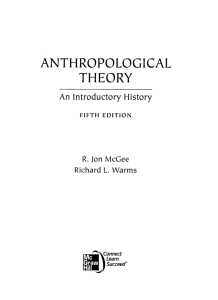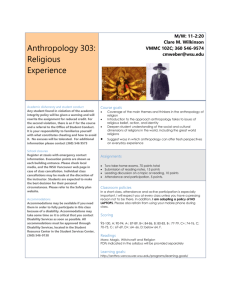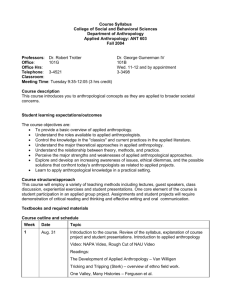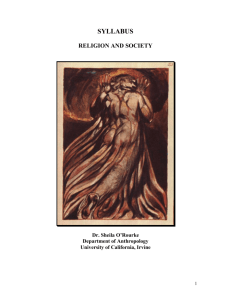Syllabus - Graduate Institute of International and Development Studies
advertisement
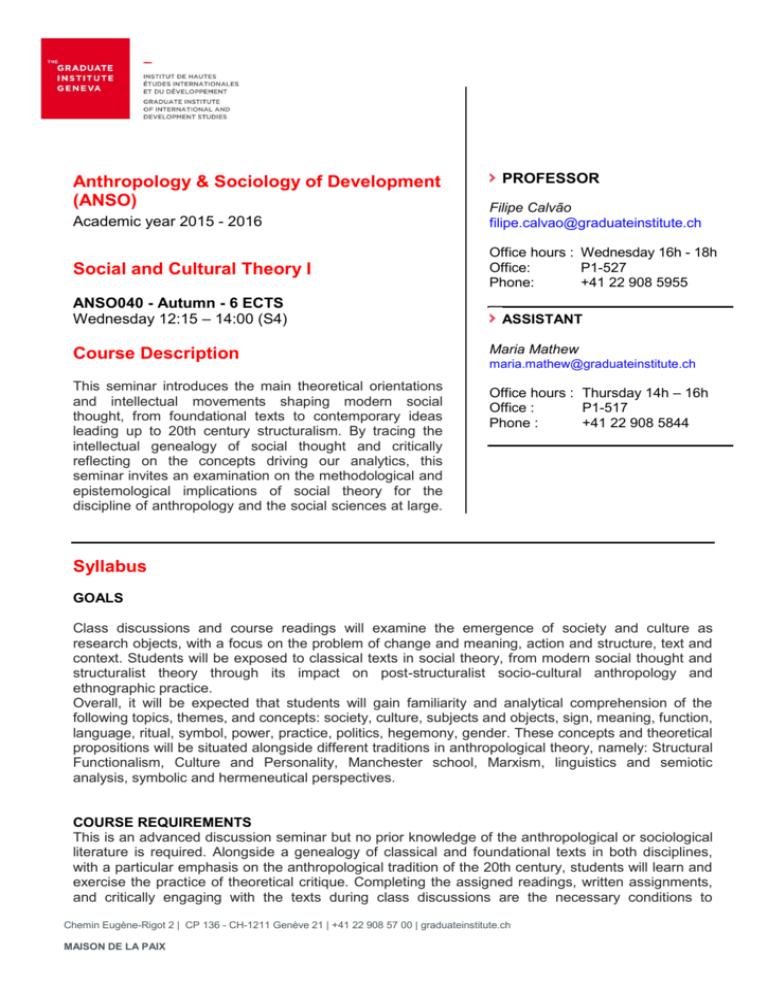
Anthropology & Sociology of Development (ANSO) PROFESSOR Academic year 2015 - 2016 Filipe Calvão filipe.calvao@graduateinstitute.ch Social and Cultural Theory I Office hours : Wednesday 16h - 18h Office: P1-527 Phone: +41 22 908 5955 ANSO040 - Autumn - 6 ECTS Wednesday 12:15 – 14:00 (S4) ASSISTANT Course Description Maria Mathew This seminar introduces the main theoretical orientations and intellectual movements shaping modern social thought, from foundational texts to contemporary ideas leading up to 20th century structuralism. By tracing the intellectual genealogy of social thought and critically reflecting on the concepts driving our analytics, this seminar invites an examination on the methodological and epistemological implications of social theory for the discipline of anthropology and the social sciences at large. Office hours : Thursday 14h – 16h Office : P1-517 Phone : +41 22 908 5844 maria.mathew@graduateinstitute.ch Syllabus GOALS Class discussions and course readings will examine the emergence of society and culture as research objects, with a focus on the problem of change and meaning, action and structure, text and context. Students will be exposed to classical texts in social theory, from modern social thought and structuralist theory through its impact on post-structuralist socio-cultural anthropology and ethnographic practice. Overall, it will be expected that students will gain familiarity and analytical comprehension of the following topics, themes, and concepts: society, culture, subjects and objects, sign, meaning, function, language, ritual, symbol, power, practice, politics, hegemony, gender. These concepts and theoretical propositions will be situated alongside different traditions in anthropological theory, namely: Structural Functionalism, Culture and Personality, Manchester school, Marxism, linguistics and semiotic analysis, symbolic and hermeneutical perspectives. COURSE REQUIREMENTS This is an advanced discussion seminar but no prior knowledge of the anthropological or sociological literature is required. Alongside a genealogy of classical and foundational texts in both disciplines, with a particular emphasis on the anthropological tradition of the 20th century, students will learn and exercise the practice of theoretical critique. Completing the assigned readings, written assignments, and critically engaging with the texts during class discussions are the necessary conditions to Chemin Eugène-Rigot 2 | CP 136 - CH-1211 Genève 21 | +41 22 908 57 00 | graduateinstitute.ch MAISON DE LA PAIX successfully attend this seminar. Grading will reflect the completion of these assignments as well as the student’s knowledge acquisition, and demonstration of critical and analytical skills. EVALUATION a) Participation (15%) Participating in class discussions and fostering a collegial environment for the exchange of ideas is a quintessential part of your graduate training. Preparing a presentation and practicing your oral skills are critical to the success of your participation. There are different ways of doing so: for example, you may want to clarify a passage from the text; identify the main concepts used; connect the readings to a subject matter or issue closer to your interests; problematize or contradict the author’s claims. Not everyone is comfortable speaking in public but following certain techniques will help you improve your ability to discuss and present a text collectively: Reading groups: “discovering” theory does not have to be an individual task. Organizing a reading session with one or more of your colleagues may in fact be a pleasurable and prolific way to engage a given text and share the burden of interpretation. Focusing on specific terms: depending on where your interests lie, you may want to track how certain concepts and terms are differently deployed in the texts. Keep notes as you read: these will help you formulate questions for discussion. While it is useful to think about a question prior to coming to class, don’t wait for a fullyfledged idea before intervening. Pay attention to the discussion and do not hesitate to build on someone else’s observations or return to a point previously discussed. Alternative views and disagreements are encouraged, provided the criticism is presented with respect and a constructive spirit. Always remember that there are no “wrong” comments. NB: French speakers are encouraged to intervene and submit their assignments in French. A list of reading resources in French is available below and will be placed on hold (reserved) in the library. b) Presentation: theory through media (15%) Once in the semester, students (in groups of 2 or 3) will present the texts for one class session and lead the discussion. Rather than simply offering a summary of the text, students will be asked to connect the readings to a media piece relevant to the readings (news article, short video, cartoon, photo collection, or any other media). On Monday prior to the class, the group should email the selected piece to the professor and teaching assistant, along with a brief explanation (no more than one page) of the connections to the readings, as well as the strengths and limits of the theory to account for the media selected or vice-versa. The success of this presentation will depend on the novel and illuminating connections established between the topic under discussion and the issues raised by the complementary media chosen. This presentation is expected to help the class relate the readings to current events or ground them in a given concept or theory in ethnographic and historical contexts. Students are strongly encouraged to go beyond the mere rehearsal of course material and present the texts creatively: how can theory inform the event / situation depicted? Conversely, how can a contemporary media piece illuminate or help us better understand a theoretical text? NB: Students should feel encouraged to share additional media examples in class, beyond their allotted presentation slot. This will count towards the participation portion of the final grade. - Page 2 - c) Critical reflections (1500 words) (55%) Students will be asked to submit three short papers throughout the semester. These should offer an argument by way of a critical interrogation of the texts. Your argument should be consistent and persuasive, adequately supported with evidence from the text (quoted material should be integrated into the text). You should display a clear grasp of the author’s main point(s), and demonstrate an understanding of the complexity of the issues at hand by taking into account possible counter-arguments. Rather than offering a straightforward answer to an interpretive or conceptual problem, a good paper is one which combines excellent writing skills (minimal to no typos, clear transitions and structure, distinct authorial voice), cogency and originality of the argumentation, and the intellectual risks taken. To facilitate the task of engaging with the readings and devising your own argument, you may frame each of your reflection papers around one of the following topics and concepts: Society / Language / Meaning / Structure / Religion / Ritual / Symbol / Space / Time / Person / Fieldwork / Change / Politics These papers will be due on: 1st paper, Oct. 14 (on more than one author discussed between weeks 1-5) 2nd paper, Nov. 18 (on more than one author discussed between weeks 6-9) 3rd paper, Dec. 16 (on more than one author discussed between weeks 1013) d) Free, Creative Writing (Blog posts) (15%) Throughout the semester, students will be asked to submit short commentaries in the form of a blog post (socialculturaltheory.wordpress.com). This assignment should help you exercise your writing skills and critical engagement with the readings around a list of pre-selected topics to be decided on in class. Unlike the reflection papers, we encourage personal, creative or polemical writing, beyond the conventional canon of academic writing. Some blog entries (set to private) may be selected on occasion for discussion in class. There will be no limit to the number of blog posts submitted but there is a minimum of three posts in the semester. PART I. THE MODERNIST PROJECT: FOUNDATIONS IN CULTURE AND SOCIETY Week 1 (Sept. 16). INTRODUCTION, COURSE OVERVIEW [What is theory for? Different modes of critique; Perception and apperception, concrete and abstract; “Culture,” “habitus,” socially learned sensory conditioning and reflexive thought] Readings: - Boas, Franz. 1889. “On Alternating Sounds” (1889), pp. 47-53. - Mauss, Marcel. 1935. Techniques of the Body - Bohannan, L. 1966. Shakespeare in the Bush. Natural History, 75(7), pp. 28-33 Week 2 (Sept. 23). MARX: THE CRITIQUE OF POLITICAL ECONOMY [“The Religion of Everyday Life”; production, commodity, fetishism; historical consciousness; objectification, estrangement, alienation; Species being; Hegelian - Page 3 - dialectic] Readings [63 pages]: - Marx, Theses on Feuerbach [3 pp] - Marx, German Ideology, Part I (pp. 147-176 from Tucker’s The Marx-Engels Reader) [29 p.] - Marx, Economic and Philosophic Manuscripts of 1844 (pp. 70-81; 86-93) [18 p.] - Godelier, Maurice. Perspectives on Marxist Anthropology (chapter 6 “Market Economy and Fetishism, Magic and Science According to Marx’ Capital”, pp. 152-165) [13p.] Suggested: - Marx, Karl: “The Eighteenth Brumaire of Louis Bonaparte”; Capital (Chap. 1). Week 3 (Sept. 30). DURKHEIM AND MAUSS: SOCIETY AND SOCIAL FACTS [“The problem of knowledge is posed new terms:” what is society? L’Année Sociologique; Collective consciousness and representations; communal effervescence; Man as double; Social realism; religion as a social thing, sacred and profane; Reciprocity, gift, debt; total social facts.] Readings: - Durkheim, Émile. The Elementary Forms of Religious Life (Introduction; Conclusion III-IV), pp. 118; 433-448 [33 p.] - Durkheim, Émile. The Rules of Sociological Method. 1966 [1895]. (ch. 1 “What Is a Social Fact?”), pp. 50-59 [9 p.] - Mauss, M. The Gift (Read as much as you can, but focus on pp. 1-46) Suggested: - Durkheim, Émile. The Division of Labour in Society (Introduction, Chapter 1 “The Method of Determining this Function”), pp. 1-29 [29p.] Week 4 (Oct. 7). WEBER: ACTION AND INTERPRETATION [Subjective meaning, interpretive understanding, social action; ideal and pure types; system of symbols, legitimacy, domination, charisma, routinization; explanation and understanding] Readings [70 p]: - Weber, Max. Economy and Society: an Outline of Interpretive Sociology: “Basic Sociological Terms,” pp. 4-28; “”Sociological Categories of Economic Action”: “The Definition of Sociology and of Social Action”; “Types of Social Action”; “The Concept of Economic Action”, pp. 63-68 - Weber, The Methodology of the Social Sciences, “ ‘Objectivity’ in Social Science and Social Policy”, [Focus on pp. 50-85] Suggested: - Weber, "Politics as a vocation," pp. 129-158 - Weber, The Types of Legitimate Domination, pp. 212-254 - Page 4 - PART II. STRUCTURALISM AND ITS LIMITS **FIRST REFLECTION PAPER DUE** Week 5 (Oct. 14). BRITISH STRUCTURAL-FUNCTIONALISM [Colonialism and Indirect rule; Ethnographic method; Kinship structures and jural relationships; Function, lineage systems, and organic wholes] Readings [48 p.]: - Malinowski, Bronislaw. 1930. “Introduction: The Subject, Method and Scope of this Inquiry”, Argonauts of the Western Pacific” (pp. 1-20). - Radcliffe-Brown. 1952. Structure and Function in Primitive Society. Introduction; On the Concept of Function in Social Science (pp. 1-14; 178-187) - Lesser, Alexander. 1985. “Functionalism in Social Anthropology” in: Sidney Mintz (ed.) History, Evolution, and the Concept of Culture: Selected Papers by Alexander Lesser, pp. 45-50 Suggested: - Radcliffe-Brown, “Joking Relationships” in Structure and Function in Primitive Society Week 6 (Oct. 21). MYTH, MIND, AND REASON [Practical knowledge; Boasian Relativism and the Sapir-Whorf Hypothesis; Culture and Personality; Unconscious and underlying formal systems of thought; Habitual worlds and behavior, Context and Perspective] Readings [68 p.]: - E.E. Evans Pritchard. 1976. Witchcraft, Oracles, and Magic (abridged edition). (Chapter 2, skim 7 and 8), pp. 18-32 [14p.] - Levi-Strauss. 1963. Structural Anthropology ( “The Structural Study of Myth”) [16p.] - Sapir, Edward. 1927. The Unconscious Patterning of Behavior in Society, in Language, Culture and Society, pp. 29-42. [13p.] - Whorf, Benjamin Lee, 1956 Language, Thought, and Reality. (“The Relation of Habitual Thought and Behavior to Language”) pp. 134-159 [25p.] Suggested: - Ruth Benedict “Anthropology and the Abnormal” Journal of General Psychology 10, 1934, pp. 5982 [23p.] - Barthes, Roland. 1972. Mythologies (“The World of Wrestling”, “The Great Family of Man”), pp. 1525; 100-102. - Levi-Strauss, Savage Mind (“The Science of the Concrete”), pp. 1-33 [33p.] - Freud, S. [1919]. “The ‘Uncanny’”, pp. 1-20 [20p.] Week 7 (Oct. 28). RITUAL AND SYMBOLIC ANTHROPOLOGY [“Webs of significance”; Rites of passage; liminality; patterns; culture as text; social discourse; Interpretative anthropology; hermeneutics; symbolic and ritual action] Readings [53p.]: - Turner, Victor. The Forest of Symbols: Aspects of Ndembu Ritual (chap. 4, “Betwixt and Between”), - Page 5 - pp. 93-111 [18p.] - Douglas, Mary. Purity and Danger (Introduction), pp. 1-8. - Geertz, C. 1973. The Interpretation of Cultures (“Thick Description”), pp. 3-30 Suggested: - Turner, Victor. The Forest of Symbols: Aspects of Ndembu Ritual (“Symbols in Ndembu Ritual”) - Van Gennep, Arnold [1902] The Rites of Passage, pp. 10-13, 15-25. - Kelly, J. and M. Kaplan. 1990. “History, Structure, and Ritual”, Annual Review of Anthropology, 19, pp. 119-150. Week 8 (Nov. 4). LANGUAGE AND STRUCTURE [Signifier, signified; langue and parole; diachrony and synchrony; semiosis; synchronic structures and historical change; linguistic value and arbitrary relations] Readings [65 p.]: - Saussure, Ferdinand [1915]. Course in General Linguistics, pp. 6-23, 65-83 [35 p.] - Lévi-Strauss, “Structural Analysis in Linguistics and Anthropology”, Structural Anthropology [20 p.] - Sahlins, M. 1981. Historical Metaphors and Mythical Realities: Structure in the Early History of the Sandwich Islands Kingdom, pp. 3-8, 67-72 [10 p.] Suggested: - Leach, E. (1964). Animal Categories and Verbal Abuse. In The Essential Edmund Leach, Vol. 1. - Derrida, Jacques. 1978. “Structure, Sign and Play in the Discourses of the Human Sciences”, in Writing and Difference, pp. 278-293. Week 9 (Nov. 11). STRUCTURE IN MOTION: ORDER AND DISORDER [Event, social situation; social systems and political theory; conflict functionalism and rituals of rebellion; Manchester school;] Readings [69 p.]: - Meyer Fortes and E.E. Evans-Pritchard. 1940. “Introduction” in Meyer Fortes and E.E. EvansPritchard (eds.) African Political Systems. London: Oxford University Press, pp. 1-23 - Max Gluckman. “Analysis of a Social Situation in Modern Zululand” Bantu Studies 14, 1940, pp. 130. - Leach, Edmund. 1954. Political Systems of Highland Burma, Chapter 1 (pp. 1-17) [conclusion is suggested reading: pp. 279-292]. Suggested: - Barth, Fredrik. 1967. “On the Study of Social Change” American Anthropologist PART III. LANGUAGE IN CULTURE, CULTURE IN PRACTICE **SECOND REFLECTION PAPER DUE** Week 10 (Nov. 18). SIGN AND MEANING [Sign, Object, Interpretant; Semiotic Interactional events; Speech events; Framing; Positionality, Denotation; Icon, Index, Symbol; pragmatics and metapragmatics] - Page 6 - Readings [58 p.]: - Peirce, Logic as Semiotic: The Theory of Signs [22 p.] - Goffman, Ervin. “Footing”, in Forms of Talk. [30 p.] - Keane, W. 2003. “Semiotics and the Social Analysis of Material Things.” [16 p.] Suggested: - Austin, J. L., 1962. How to do things with Words (Lecture 1, pp. 1-11) - Silverstein, Michael. 2004, “’Cultural’ Concepts and the Language-Culture Nexus”, Current Anthropology, 45:5, pp. 621-652. Week 11 (Nov. 25). CULTURE IN PRACTICE [Action and value, intersubjective space-time; Change and value transformations; objective and embodied structures; tactics; space and language; Intention and motivation] Readings [76 p.]: - De Certeau, M. 1984. The Practice of Everyday Life (Intro, Ch. 1, 7), pp. 1-15, 91-111 [35 p.] - Munn, Nancy. 1986. The Fame of Gawa, Chapters 1, 3 (pp. 3-20; 49-73) [41 p.] Suggested: - Graeber, David. Toward an Anthropological Theory of Value (Value as the Importance of Actions), pp. 49-90. - Bourdieu, P. 1970. The Logic of Practice (The Kabyle House), pp. 271-283. - Ortner, Sherry. 1984. “Theory in Anthropology since the Sixties”, Comparative Studies in Society and History, 26:1, pp. 126-166 (read 144-160) [16p.] Week 12 (Dec. 2). GENDER AND PERFORMANCE [Embodiment, sexuality, politics of representation; sex and gender performativity; structures of domination, normalized bodies, hybrid identities] Readings [71 p.]: - Scott, Joan W. 1999. “Gender: A useful category of historical Analysis”, in Gender and the Politics of History, pp. 28-50 - Haraway, Donna. “Situated Knowledges: The Science question in feminism and the privilege of partial perspective”, in Symians, Cyborgs, and Women, pp. 183-201 - Morris, Rosalind. 1995. “All Made Up: Performance Theory and the New Anthropology of Sex and Gender” Annual Review of Anthropology 24: 567-92. Suggested: - Scott, Joan. 1991. The Evidence of Experience, Critical Inquiry, 17:4, pp. 773-797. - Butler, Judith. 1993. Bodies that Matter: on the discursive limits of “sex”, pp. 1-55 - Bauman, R. and C. L. Briggs. 1990. “Poetics and Performance as Critical Perspectives on Language and Social Life,” Annual Review of Anthropology, 19:59-88. - Page 7 - Week 13 (Dec. 9). HEGEMONY, HISTORY, CONSCIOUSNESS [Ideology and Praxis; Resistance and the return of the repressed? Class consciousness; unthinkability; Historical narrative and the production of history] Readings: - Gramsci, Antonio. Selections from the Prison Notebooks (pp. 3-14; 52-55; 321-343) - Trouillot, Michel-Rolph. 1995. Silencing the Past: Power and the Production of History (Chapter 1, 3), pp. 1-30; 70-107 - Comaroff, Jean and John Comaroff. Of Revelation and Revolution. Christianity, Colonialism, and Consciousness in South Africa, Vol. 1, pp. 13-32 Suggested: - Cohn, Bernard. 1985. “The Command of Language and the Language of Command” in Colonialism and its Forms of Knowledge. - Hall, Stuart. 1996. Gramsci’s Relevance for the Study of Race and Ethnicity, in Critical Dialogues in Cultural Studies. - Hebdige, Dick. Subculture: The Meaning of Style (Selections) **THIRD REFLECTION PAPER DUE** Week 14 (Dec. 16). THEORY AND ETHNOGRAPHY Suggested: - Ferguson, J and Akhil Gupta. 2002. Spatializing States: Toward an ethnography of neoliberal governmentality. American Ethnologist, pp. 981-1002. - Appadurai, A. “Disjuncture and Difference in the Global Cultural Economy.” 1990. Public Culture 2, pp. 1-24 - Tsing, A. Friction. An Ethnography of Global Connection (Introduction) - Comaroff, J & J. L. 2003. “Ethnography on an Awkward Scale: Postcolonial Anthropology and the Violence of Abstraction.” Ethnography 4:2, pp. 147-179. [32p.] Reading Resources in French: - Barthes, R. (2015). Mythologies. Seuil. - Bourdieu, Pierre, et al. Le sens pratique. Ed. de minuit, 1980. - Derrida, J. (1967). L'écriture et la différence (Vol. 100). Paris: Éditions du Seuil. - Durkheim, E. (1893). De la division du travail social. Paris : PUF, 2007 - Durkheim, E. (2004). Les Règles de la méthode sociologique. Paris, Presses universitaires de France. - Durkheim, E., (1968). Les formes élémentaires de la vie religieuse. Paris : Presses universitaires de France. - Godelier, M. (1977). Économie marchande, fétichisme, magie et science selon Marx dans Le Capital. M. Godelier, Horizon, trajets marxistes en anthropologie, 2, 201-224. Paris : F. Mespero - Lévi-Strauss, Claude.1973. Anthropologie structurale Paris ; Plon - Page 8 -

